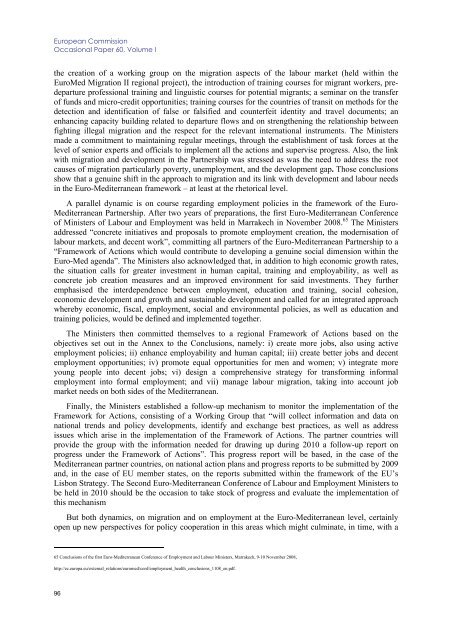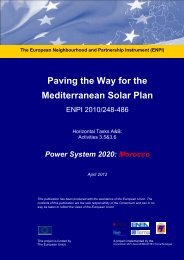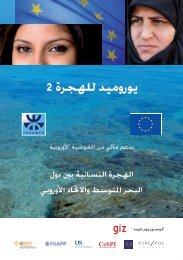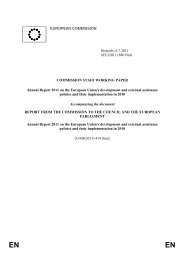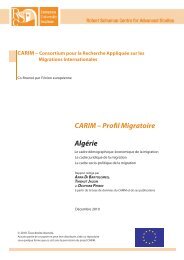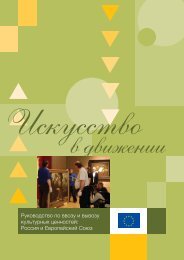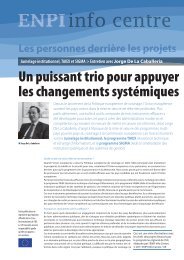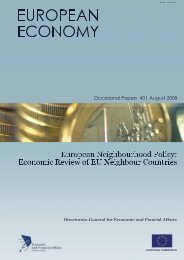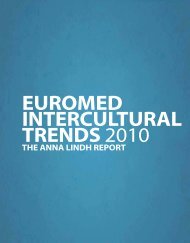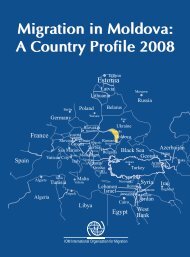<strong>European</strong> CommissionOccasional Paper 60, Volume Ithe creation of a working group on the <strong>migration</strong> aspects of the labour <strong>market</strong> (held within theEuroMed Migration II regional project), the introduction of training courses for migrant workers, predepartureprofessional training <strong>and</strong> linguistic courses for potential migrants; a seminar on the transferof funds <strong>and</strong> micro-credit opportunities; training courses for the countries of transit on methods for thedetection <strong>and</strong> identification of false or falsified <strong>and</strong> counterfeit identity <strong>and</strong> travel documents; anenhancing capacity building related to departure <strong>flows</strong> <strong>and</strong> on strengthening the relationship betweenfighting illegal <strong>migration</strong> <strong>and</strong> the respect for the relevant international instruments. The Ministersmade a commitment to maintaining regular meetings, through the establishment of task forces at thelevel of senior experts <strong>and</strong> officials to implement all the actions <strong>and</strong> supervise progress. Also, the linkwith <strong>migration</strong> <strong>and</strong> development in the Partnership was stressed as was the need to address the rootcauses of <strong>migration</strong> particularly poverty, unemployment, <strong>and</strong> the development gap. Those conclusionsshow that a genuine shift in the approach to <strong>migration</strong> <strong>and</strong> its link with development <strong>and</strong> labour needsin the Euro-Mediterranean framework – at least at the rhetorical level.A parallel dynamic is on course regarding employment policies in the framework of the Euro-Mediterranean Partnership. After two years of preparations, the first Euro-Mediterranean Conferenceof Ministers of <strong>Labour</strong> <strong>and</strong> Employment was held in Marrakech in November 2008. 65 The Ministersaddressed “concrete initiatives <strong>and</strong> proposals to promote employment creation, the modernisation oflabour <strong>market</strong>s, <strong>and</strong> decent work”, committing all partners of the Euro-Mediterranean Partnership to a“Framework of Actions which would contribute to developing a genuine social dimension within theEuro-Med agenda”. The Ministers also acknowledged that, in addition to high economic growth rates,the situation calls for greater investment in human capital, training <strong>and</strong> employability, as well asconcrete job creation measures <strong>and</strong> an improved environment for said investments. They furtheremphasised the interdependence between employment, education <strong>and</strong> training, social cohesion,economic development <strong>and</strong> growth <strong>and</strong> sustainable development <strong>and</strong> called for an integrated approachwhereby economic, fiscal, employment, social <strong>and</strong> environmental policies, as well as education <strong>and</strong>training policies, would be defined <strong>and</strong> implemented together.The Ministers then committed themselves to a regional Framework of Actions based on theobjectives set out in the Annex to the Conclusions, namely: i) create more jobs, also using activeemployment policies; ii) enhance employability <strong>and</strong> human capital; iii) create better jobs <strong>and</strong> decentemployment opportunities; iv) promote equal opportunities for men <strong>and</strong> women; v) integrate moreyoung people into decent jobs; vi) design a comprehensive strategy for transforming informalemployment into formal employment; <strong>and</strong> vii) manage labour <strong>migration</strong>, taking into account job<strong>market</strong> needs on both sides of the Mediterranean.Finally, the Ministers established a follow-up mechanism to monitor the implementation of theFramework for Actions, consisting of a Working Group that “will collect information <strong>and</strong> data onnational trends <strong>and</strong> policy developments, identify <strong>and</strong> exchange best practices, as well as addressissues which arise in the implementation of the Framework of Actions. The partner countries willprovide the group with the information needed for drawing up during 2010 a follow-up report onprogress under the Framework of Actions”. This progress report will be based, in the case of theMediterranean partner countries, on national action plans <strong>and</strong> progress reports to be submitted by 2009<strong>and</strong>, in the case of EU member states, on the reports submitted within the framework of the EU’sLisbon Strategy. The Second Euro-Mediterranean Conference of <strong>Labour</strong> <strong>and</strong> Employment Ministers tobe held in 2010 should be the occasion to take stock of progress <strong>and</strong> evaluate the implementation ofthis mechanismBut both dynamics, on <strong>migration</strong> <strong>and</strong> on employment at the Euro-Mediterranean level, certainlyopen up new perspectives for policy cooperation in this areas which might culminate, in time, with a65 Conclusions of the first Euro-Mediterranean Conference of Employment <strong>and</strong> <strong>Labour</strong> Ministers, Marrakech, 9-10 November 2008,http://ec.europa.eu/external_relations/euromed/conf/employment_health_conclusions_1108_en.pdf.96
Chapter IFinal Reporttrue Euro-Mediterranean Employment <strong>and</strong> Migration Strategy finally able to address the issue ofemployment <strong>and</strong> labour <strong>migration</strong> at the regional level.7. Proposals for Action <strong>and</strong> Policy Recommendations7.1. Data <strong>and</strong> Research Gaps on <strong>Labour</strong> Markets <strong>and</strong> Migration in AMCsAs the literature review produced for this Study has shown (Marchetta 2009), there is a shortage ofresearch on labour <strong>and</strong> <strong>migration</strong> in AMCs, <strong>and</strong> even more so on the interaction between both. Evidencefrom the literature comes mainly from other regions, <strong>and</strong> even this is very scarce in some respects, forinstance the impact of <strong>migration</strong> on labour <strong>market</strong>s of countries of origin. So a first step in facing thehuge challenges of employment in AMCs <strong>and</strong> in addressing the complex issue of <strong>migration</strong> in the regionis to know more about both its magnitude <strong>and</strong> characteristics. This Study makes a contribution in thisdirection by collecting best available national data according to a common template <strong>and</strong> systematizingthe existent literature on the impact of <strong>migration</strong> on labour <strong>market</strong>, providing a possible analyticalframework that could guide future research on this topicIndeed, despite recent improvements in the availability <strong>and</strong> the quality of employment <strong>and</strong> <strong>migration</strong>statistics for AMCs any serious analysis of labour <strong>market</strong>s <strong>and</strong> <strong>migration</strong> in Arab MediterraneanCountries is seriously hampered by the unavailability of data across the region, the unreliability <strong>and</strong>inconsistency of available data <strong>and</strong> the difficulty of comparing country to country. Discrepanciesbetween data gathered by countries of destination (in particular OECD countries, since Gulf <strong>and</strong> otherArab countries are notorious for the shortcomings of their im<strong>migration</strong> statistics) <strong>and</strong> those produced bycountries of origin are enormous (see Table 3 in Fargues 2009, p. 479), <strong>and</strong> not only due to irregular<strong>migration</strong>. One particular shortcoming of existing data is the unavailability of statistics broken down byregions or lower administrative units within a country, which would allow for a much more sophisticatedcross-sectional analysis, for instance, on the impact of remittances on labour <strong>market</strong> <strong>performance</strong>(wages, labour participation, unemployment rates…).In terms of issues, some obvious research gaps are related to the behaviour of the informal sector <strong>and</strong>how it interrelates with the formal labour <strong>market</strong> <strong>and</strong> international <strong>migration</strong> (informal employment is atrue black hole of knowledge for labour <strong>market</strong>s in the region), the interaction between rural-urbaninternal <strong>migration</strong> <strong>and</strong> international <strong>migration</strong> (urban labour <strong>market</strong>s, often informal, tend to play animportant role in this sequence) <strong>and</strong> the extent <strong>and</strong> behaviour of inter-Arab <strong>migration</strong> (an important partof it still unregistered). Finally, a more thorough analysis of education systems <strong>and</strong> skills acquisition,carried out too at the micro-level (through surveys on school to work itineraries <strong>and</strong> on the differenttracks taken by those who ended up migrating) would offer important insights into the shortcomings ofthe educational system.7.2. A Research Agenda for <strong>Labour</strong> Markets <strong>and</strong> Migration in AMCsGiven the difficulties of compiling basic information on labour <strong>market</strong>s <strong>and</strong> <strong>migration</strong> in AMCs for theNational Background Papers <strong>and</strong> the lack of specific research focused on evidence from the region, theresearch agenda on labour <strong>market</strong>s <strong>and</strong> <strong>migration</strong> in AMCs should take a multilevel approach. Thismight include, in this sequence:- A region-wide program to produce a complete set of st<strong>and</strong>ardised statistics on labour <strong>market</strong>s <strong>and</strong><strong>migration</strong> based on national statistical sources (<strong>and</strong>, when applicable, international statistical data,such as the OECD <strong>migration</strong> database) using the same methodologies throughout the region forreasons of comparability. This would allow researchers to fill in the current gaps on the number of97
- Page 5 and 6:
STUDYLABOUR MARKETS PERFORMANCE AND
- Page 7 and 8:
Table of ContentsLABOUR MARKETS PER
- Page 10:
8.1 Actual migration and consumptio
- Page 15 and 16:
Chapter IFinal Report 15 MILLION NE
- Page 17 and 18:
Chapter IFinal Report …so that MI
- Page 19 and 20:
Chapter IFinal Reportroots). The cu
- Page 21 and 22:
Chapter IFinal Report In AMCs, REMI
- Page 23 and 24:
Chapter IFinal Reportpolicies. This
- Page 25 and 26:
Chapter IFinal ReportMediterranean
- Page 27 and 28:
Chapter IFinal ReportMore recently,
- Page 29 and 30:
Chapter IFinal Reportfor EU employm
- Page 31 and 32:
Chapter IFinal Reportchosen, these
- Page 33 and 34:
Chapter IFinal Reportexit of women
- Page 35 and 36:
Chapter IFinal ReportFigure 1.2.1.
- Page 37 and 38:
Chapter IFinal ReportA Declining Em
- Page 39 and 40:
Chapter IFinal ReportThe same year,
- Page 41 and 42:
Chapter IFinal ReportTable 2.2.1. I
- Page 43 and 44:
Chapter IFinal Reportminimum wages
- Page 45 and 46:
Chapter IFinal Report2.4 Unemployme
- Page 47 and 48: Chapter IFinal ReportYouth Unemploy
- Page 49 and 50: Chapter IFinal ReportBut one should
- Page 51 and 52: Chapter IFinal Reportmillion) 10 .
- Page 53 and 54: Chapter IFinal Reportmight intensif
- Page 55 and 56: Chapter IFinal Reporttrue labour ma
- Page 57 and 58: Chapter IFinal Reportto reform the
- Page 59 and 60: Chapter IFinal ReportFrom a differe
- Page 61 and 62: Chapter IFinal ReportTable 4.2.1 Ou
- Page 63 and 64: Chapter IFinal ReportSource: Adams
- Page 65 and 66: Chapter IFinal Reportin the destina
- Page 67 and 68: Chapter IFinal ReportIn conclusion,
- Page 69 and 70: Chapter IFinal Reportorganised in B
- Page 71 and 72: Chapter IFinal Reportsecond Intifad
- Page 73 and 74: Chapter IFinal Reportstands at 29.7
- Page 75 and 76: Chapter IFinal Reportconstruction w
- Page 77 and 78: Chapter IFinal ReportAs far as the
- Page 79 and 80: Chapter IFinal Reportother cases, l
- Page 81 and 82: Chapter IFinal Reportunemployment a
- Page 83 and 84: Chapter IFinal Reportof Egypt, so f
- Page 85 and 86: Chapter IFinal ReportWhile progress
- Page 87 and 88: Chapter IFinal ReportThese reservat
- Page 89 and 90: Chapter IFinal ReportAs Figure 6.3.
- Page 91 and 92: Chapter IFinal Reportin skill devel
- Page 93 and 94: Chapter IFinal ReportThe Directive
- Page 95 and 96: Chapter IFinal ReportThe need for
- Page 97: Chapter IFinal Reportobjectives are
- Page 101 and 102: Chapter IFinal Report- Putting empl
- Page 103 and 104: Chapter IFinal Report promotion of
- Page 105 and 106: Chapter IFinal ReportOtherADAMS, R.
- Page 107 and 108: Chapter IFinal ReportDE BEL-AIR, F.
- Page 109 and 110: Chapter IFinal ReportGUPTA, S., C.
- Page 111 and 112: Chapter IFinal ReportOECD (2000): M
- Page 113 and 114: Chapter II - Thematic Background Pa
- Page 115 and 116: Chapter IIThe impact of migration o
- Page 117 and 118: Chapter IIThe impact of migration o
- Page 119 and 120: Chapter IIThe impact of migration o
- Page 121 and 122: Chapter IIThe impact of migration o
- Page 123 and 124: Chapter IIThe impact of migration o
- Page 125 and 126: Chapter IIThe impact of migration o
- Page 127 and 128: Chapter IIThe impact of migration o
- Page 129 and 130: Chapter IIThe impact of migration o
- Page 131 and 132: Chapter IIThe impact of migration o
- Page 133 and 134: Chapter IIThe impact of migration o
- Page 135 and 136: Chapter IIThe impact of migration o
- Page 137 and 138: Chapter IIThe impact of migration o
- Page 139 and 140: Chapter IIThe impact of migration o
- Page 141 and 142: Chapter IIThe impact of migration o
- Page 143 and 144: Chapter IIThe impact of migration o
- Page 145 and 146: Chapter IIThe impact of migration o
- Page 147 and 148: Chapter IIThe impact of migration o
- Page 149 and 150:
Chapter IIThe impact of migration o
- Page 151 and 152:
Chapter IIThe impact of migration o
- Page 153 and 154:
Chapter IIThe impact of migration o
- Page 155 and 156:
Chapter IIThe impact of migration o
- Page 157 and 158:
Chapter IIThe impact of migration o
- Page 159 and 160:
Chapter IIThe impact of migration o
- Page 161 and 162:
Chapter III - Thematic Background P
- Page 163 and 164:
Chapter IIIEU Migration Policy towa
- Page 165 and 166:
Chapter IIIEU Migration Policy towa
- Page 167 and 168:
Chapter IIIEU Migration Policy towa
- Page 169 and 170:
Chapter IIIEU Migration Policy towa
- Page 171 and 172:
Chapter IIIEU Migration Policy towa
- Page 173 and 174:
Chapter IIIEU Migration Policy towa
- Page 175 and 176:
Chapter IIIEU Migration Policy towa
- Page 177 and 178:
Chapter IIIEU Migration Policy towa
- Page 179 and 180:
Chapter IIIEU Migration Policy towa
- Page 181 and 182:
Chapter IIIEU Migration Policy towa
- Page 183 and 184:
Chapter IIIEU Migration Policy towa
- Page 185 and 186:
Chapter IIIEU Migration Policy towa
- Page 187 and 188:
Chapter IIIEU Migration Policy towa
- Page 189 and 190:
Chapter IIIEU Migration Policy towa
- Page 191 and 192:
Chapter IIIEU Migration Policy towa
- Page 193 and 194:
Chapter IIIEU Migration Policy towa
- Page 195 and 196:
Chapter IIIEU Migration Policy towa
- Page 197 and 198:
Chapter IIIEU Migration Policy towa
- Page 199 and 200:
Chapter IIIEU Migration Policy towa
- Page 201 and 202:
Chapter IIIEU Migration Policy towa
- Page 203 and 204:
Chapter IIIEU Migration Policy towa
- Page 205 and 206:
Chapter IIIEU Migration Policy towa
- Page 207:
Chapter IIIEU Migration Policy towa


